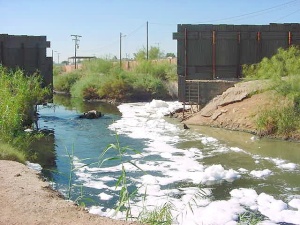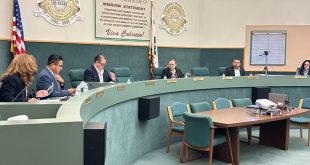Rep. Juan Vargas (CA-51), along with Peters (CA-52), Ruiz (CA-36), Levin (CA-49), Jacobs (CA-53), and Issa (CA-50) introduced the Border Water Quality Restoration and Protection Act, a companion bill to Senators Feinstein and Padilla’s (D-CA) legislation introduced last week.
The bill will help address pollution along the U.S.-Mexico border by designating the Environmental Protection Agency (EPA) as the lead agency. The EPA will coordinate all federal, state, and local agencies to plan and construct infrastructure projects to combat pollution along the border.
“The biggest challenge in addressing this environmental and public health crisis is that a majority of the pollution results from transboundary flows. Addressing cross-border pollution in our region requires strong communication between agencies— from both sides of the border,” said Rep. Vargas. “Last year, I worked with the San Diego Congressional Delegation to secure $300 million in funding to address cross-border pollution. This bill builds on that success by making EPA the lead agency to coordinate efforts between federal, state, local, and Mexican entities to properly allocate that funding towards infrastructure and restoration programs to help address this decades-long problem. The Border Water Quality Restoration Act brings us one step closer to preventing wastewater from flowing into the United States.”
“Toxic sewage and waste have flowed into the United States from Mexico for years because federal agencies haven’t stepped up to deal with the problem,” said Senator Dianne Feinstein. “The people of Southern California have been forced to suffer while different federal agencies keep passing the buck. This bill will put an end to the confusion by putting the EPA in charge of coordinating efforts and fixing the problem. I’m grateful to the Government Accountability Office for its detailed and informative report on this long-standing issue that must be addressed now.”
“For too long, toxic waste and raw sewage have flowed across the border into Southern California, polluting our air and water and depriving border communities of outdoor recreation and economic opportunities,” said Senator Alex Padilla. “While federal agencies have largely ignored this problem, the health and safety of our coastal communities remain threatened. That’s why I’m joining Senator Feinstein to introduce the Border Water Quality Restoration and Protection Act to direct the EPA to take the lead in finally addressing the Tijuana River pollution problem.”
“Sewage discharge in the Tijuana River Valley has been a decades-long public health and environmental catastrophe for San Diegans and those in Coronado,” said Rep. Scott Peters. “One of the largest barriers we face in fixing the problem is that everyone points to someone else when decisions need to be made. This bill puts the EPA in charge and provides the accountability this crisis requires to force a real and meaningful solution that engages both Mexico and our local partners to put an end to this pollution.”
“Cleaning up the New River is critical for protecting the public’s health and water quality at the Salton Sea,” said Dr. Raul Ruiz. “I’m glad to partner with Rep. Vargas to bring more federal resources to help protect our environment, clean one of the dirtiest rivers in the country, and improve the lives of residents near the Sea.”
“The toxic pollution flowing across the U.S.-Mexico border has plagued our region for generations, which is why I was proud to work with the San Diego Congressional delegation to secure $300 million for cleanup efforts,” said Rep. Mike Levin. “While that progress was historic, now we need to make sure those funds are spent quickly and efficiently on desperately-needed wastewater infrastructure projects. This legislation will help ensure that we make concrete progress on the ground as soon as possible by strengthening coordination between federal, state, and local efforts. I’m proud to join Rep. Vargas in reintroducing this bill and will continue to work with the EPA to make long-overdue progress on this challenge.”
“Improving water quality in our region is essential to our quality of life, economy, and public health, and it should be a top priority,” said Rep. Sara Jacobs. I’m proud to cosponsor this legislation to improve coordination between federal, state, and local partners, and codify and improve the EPA’s work in the area. Water quality is so vitally important here in Southern California and I thank Senator Feinstein and Congressman Vargas for their work on this legislation.”
“This is a comprehensive solution that incorporates local engagement to determine the best use of federal resources, and I believe our bipartisan approach will make the critical difference in resolving a problem that has impacted the San Diego region for many years,” said Rep. Darrell Issa.
The Border Water Quality Restoration and Protection Act is supported by the California Environmental Protection Agency; the California Natural Resources Agency; San Diego and Imperial counties; the cities of San Diego, Imperial Beach, and Coronado; Chula Vista Mayor Mary Casillas Salas; the Port of San Diego; the San Diego Regional Chamber of Commerce; and WILDCOAST.
Background:
Senator Feinstein and Representatives Vargas, Davis, Peters, and Levin have fought to secure funding to build the necessary infrastructure to reduce pollution along the U.S.-Mexico border through Senate and House actions. They have:
Secured more than $200 million for the EPA’s Border Water Infrastructure Program, despite recent efforts by the Trump administration to eliminate the program and $300 million in the United States-Mexico-Canada Agreement for water quality improvement projects along the border.
Passed the bipartisan North American Development Bank Improvement Act to reauthorize and strengthen the bank so it can continue to invest in environmental infrastructure along the border.
Requested a Government Accountability Office report that found that the IBWC lacked the coordination and effectiveness to solve the problem.
Specifically, the report found that “Congress should consider providing direction and specific authorization for USIBWC to take action to resolve the long-standing water quality problems associated with transboundary stormwater flows…including identifying alternatives, cost estimates, funding sources, and time frames, in coordination with federal, state, and local partners.”
Met with Mexican ambassadors to the United States to push their government to invest in wastewater infrastructure.
Passed a requirement that the secretary of the state creates an interagency plan to address the effects of toxic cross-border flows on communities in the United States.
Passed a requirement that Customs and Border Protection submit a report on its efforts to protect its personnel from toxic cross-border flows.






